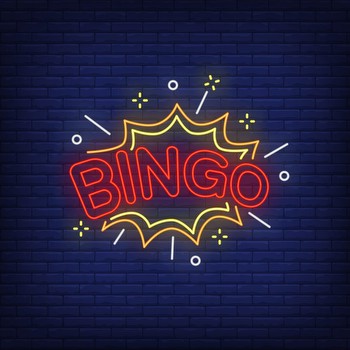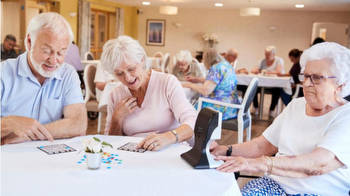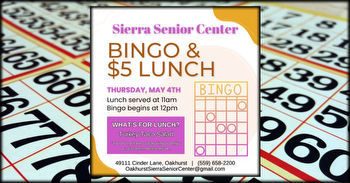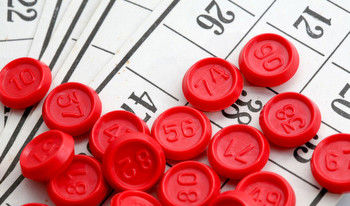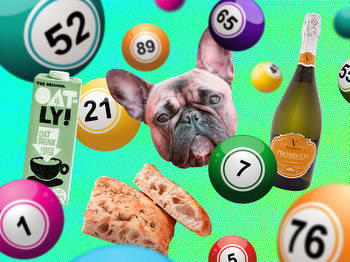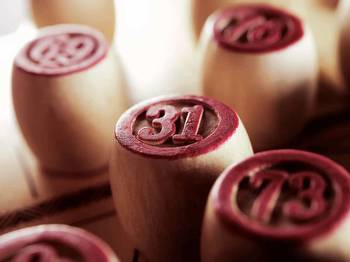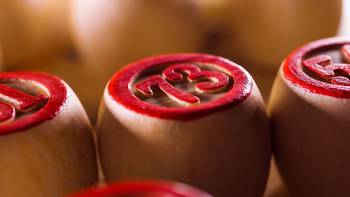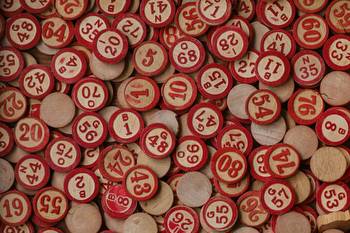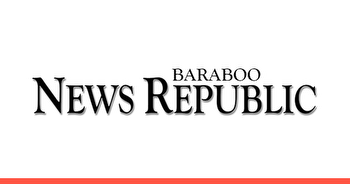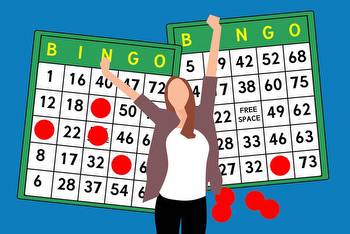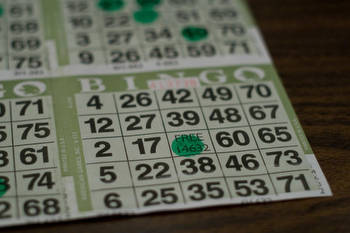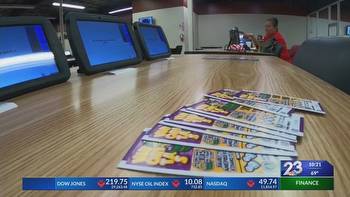How the Beloved Game of Bingo Took Over Texas
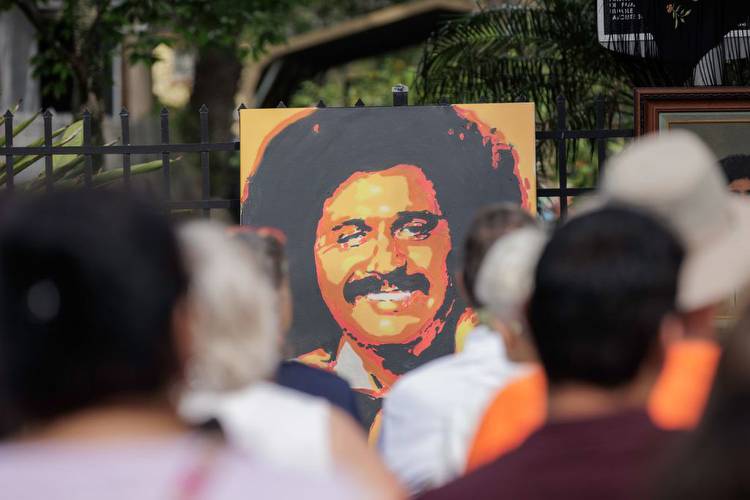
On a hot afternoon in Lindsay, a town just south of the Texas-Oklahoma border near Denton, about 40 older adults congregate in the air-conditioned building next door to St. Peter’s Catholic Church. Along with a lunch of cold-cut sandwiches, there is bingo, and the group eagerly awaits parishioner Jeannette Hellinger to call the letters and numbers, which she draws from an old coffee can. After each call, the players carefully attend to their old-fashioned bingo cards, made of cardboard with sliders that cover up the numbers.
“It’s simple but they love it and really look forward to it. They come for fellowship,” says Alice Kendall, who organizes these bingo lunches with her sister, Mary Bayer, twice a month. They took over running this social activity for fellow parishioners and other retired folks in the Lindsay community from their mother, Louise Schad, who passed away in 2019 and had originally brought bingo to St. Peter’s in 2003.
St. Peter’s bingo isn’t a fundraiser and there are no cash jackpots. Prizes are practical donated items like bleach wipes, Kleenex, and cake mixes. But that won’t diminish the enthusiasm whenever a player gets to shout “Bingo!”
It all sounds so wholesome and maybe even familiar, but it’s not the whole story of bingo in Texas. State history is filled with emotional, legal battles over bingo because the beloved game of young and old alike is also a traditional form of gambling. Texas banned gambling—with no exceptions—back in 1903, about 30 years before bingo was ever played in the state but centuries after the game was invented and already being played by millions.
Bingo’s origin dates to 16th century Italy with the creation of a very popular weekly lottery called Lo Guioco del Lottl D’Italia (“The Italian Lottery Game”), a form of which continues to this day. This very popular game of matching numbers with the lottery’s randomly chosen numbers in order to win money appeared in France in the 18th century. Under the name “Le Lotto,” it was played on cards with rows and columns of numbers. Well before the turn of the 20th century, Germany and Great Britain had also embraced the game.
During the late 1920s, the game sprung up in America using a fairly standardized 75-number approach. Spread via the traveling carnival circuits, it was often called “beano” because players used inexpensive dried beans to mark their cards.
“Bingo” was trademarked as a catchier title for a home version of the game in 1929 by New York toy salesman Edwin Lowe. The National Catholic Register wrote that the following year, after a Columbia University mathematician created thousands of cards with unique number presentations, bingo was scaled up specifically for a Catholic church fundraiser inPennsylvania.
One of the early mentions of bingo in Texas, found on the “Woman’s Page” of Sweetwater’s Nolan County News in Nov. 17, 1932, reported that the Mexican Women’s Health Club served a “typical Spanish supper” to members of the Business and Professional Women’s Club at a local Catholic church. “After the dinner, the members remained for bingo.”
Curiously, before bingo arrived, a similar game of chance from Mexico, lotería, was being played in Texas and remains popular. French businessman Clemente Jacques first commercialized the game in Mexico in 1887; lotería’s players match pictures from those pulled from a deck of cards, traditionally using dried beans as markers.
As bingo swept across Texas, newspapers often printed the name of the winners at such functions as well as the bingo prizes, like a pink and silver compact, a potted plant, and a linen handkerchief. They also printed children’s letters to Santa asking for Christmas bingo games.
Bingo was widely played for money, including games benefiting charities, schools, and churches. Newspapers noted when bingo proceeds helped fix up Little League fields and kept VFW halls running while simultaneously reporting how one Texas town or the other, like Corpus Christi in 1953, declared that every single game of bingo involving cash was illegal. Because gambling was still outlawed in Texas, bingo halls were raided by vice squads. Games hosted by churches, fraternal orders, and Boys Clubs were shut down.
In 1975, the Associated Press wrote about the “state gambling law that technically covers bingo,” and stated bluntly, “The law, however, is ignored in most Texas cities as authorities weigh its intent and the purpose of the game and decide to look the other way.”
Following decades of legal battles and, finally, after direct voter input, charitable bingo was officially secured for Texans in 1991. Article 3, Section 47 of the state constitution enshrines bingo—by name—as a legal exception to the state gaming laws when conducted for charitable purposes. Individual municipalities, however, may still outlaw bingo. (Around two dozen Texas counties remain bingo-free.)
According to the Charitable Bingo Operations Division of the Texas Lottery Commission, more than 10 million people attended legal bingo games in 2022. And as of March 10, there were 1,490 approved bingo-playing programs running in Texas. Revenue from these bingo games goes into the general state lottery fund, while the bingo centers are allowed to pick which charitable organizations receive donations.
Now considered “social gaming,” charitable bingo is played every day of the week in Texas at licensed bingo halls. Golden Bingo Family New Braunfels operates a for-charity bingo hall in New Braunfels at 145 W. Klein Road, and one recent Friday evening about 55 people of all ages gathered there to hear manager Hannah Chavez call the games.
Chavez, who’s called bingo for three years, stands behind a see-through compressed-air chamber circulating 75 bingo balls. They’re randomly forced upward one at a time as Chavez announces the letter and number while simultaneously registering the draw on a large flashboard.
Large paper sheets hold up to 18 bingo cards. Long gone are the beans; players typically mark their numbers using handheld ink daubers. Computer tablets are used to play up to 66 cards at once, and around the hall some players, including a single man in his 30s, several families with young children, possibly a first date between a couple of 20-somethings, and several women who sit apart but appear to know one another rather well, watch six or seven tablets each.
What hasn’t changed is that every game is won by the first player to get “Bingo!” (The prize is split for multiple winners.) Jackpots can reach $750 a session.
Along with the thrill of winning while supporting designated charities, players still gather for the social component. “I love that I can connect with my customers,” Chavez says. “I see some of them on a daily basis and I really get to know a little bit about their lives.”
Things are a little different at the Kickapoo Lucky Eagle Casino Hotel, owned by a federally recognized Native American tribe in Eagle Pass. The casino has offered bingo as a legal form of gambling since 1996. Players compete for serious money, without the charitable angle, inside the 3,200-square-foot bingo room with wall-mounted screens on all sides. On a Saturday afternoon in March, the 21-and-over crowd favors computer tablets to paper when playing high-stakes bingo for cash payouts that can run five figures.
“We see over 30,000 guests annually and that is more than 600 unique players weekly,” says Rene Martinez, the casino’s bingo manager. “Technology has helped introduce new players to bingo and made it easier for guests to keep up with the action of the game. It’s made the game more enjoyable.” Martinez adds that even with big money on the line, the game remains a social activity. “With poker and slots, the players mostly play by themselves. For bingo, every player is playing together and interacting with every draw.”
At its core, bingo remains a simple game. Winning is a matter of pure luck, same as it’s been for centuries. Hannah Chavez, who at the age of 23 isn’t just a bingo caller but also a player, says using lucky charms is common. “When I go play bingo I have a lucky dauber that I think gives me a little more luck,” she says, adding, “I’ve had a few big wins.”
Chavez and others might be interested knowing that on May 6, Lucky Eagle plays bingo for a $25,000 jackpot. That’s a lot of beans.








